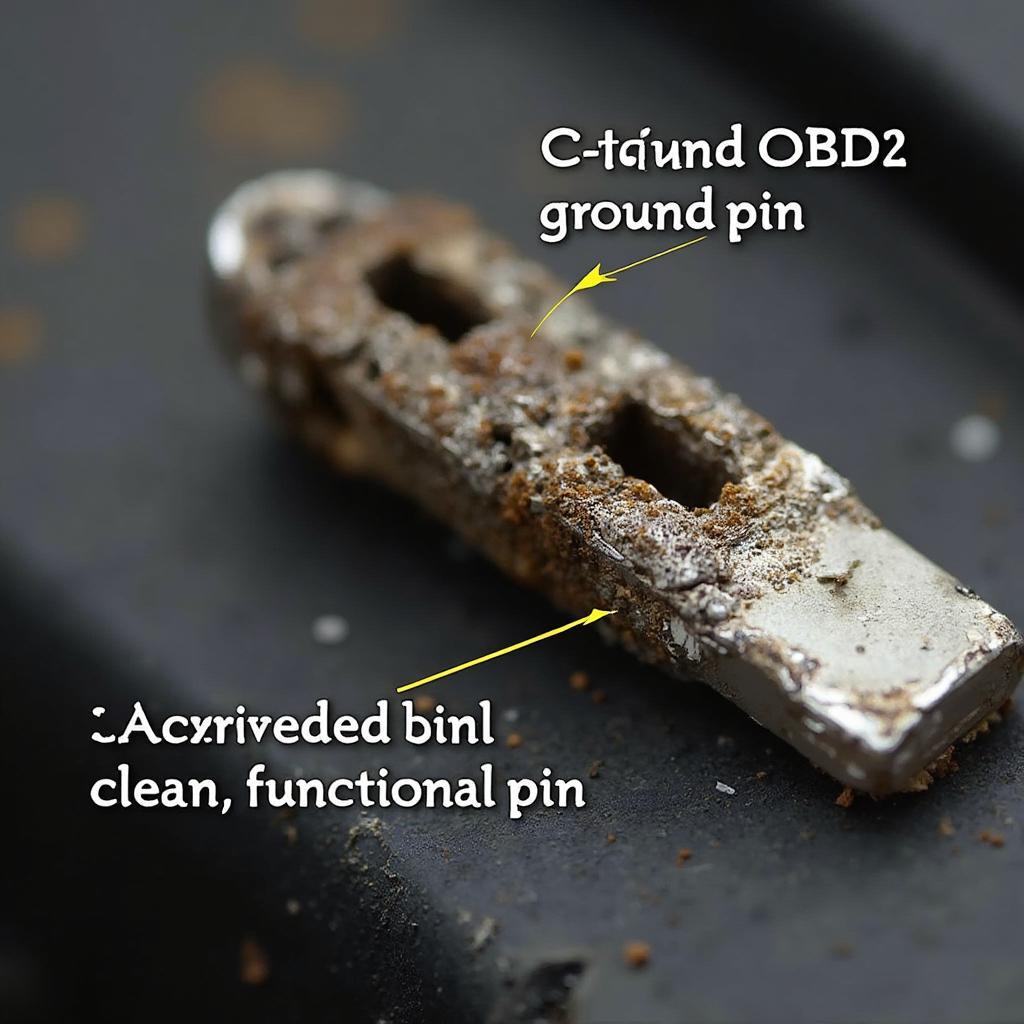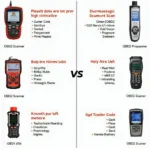OBD2 ground pins are essential for the proper functioning of your vehicle’s onboard diagnostics system. These pins provide the necessary grounding for the communication between the OBD2 scanner and the various electronic control units (ECUs) in your car. Understanding their function is crucial for anyone working with car diagnostics.
If your OBD2 scanner isn’t working correctly, one of the first things to check is the connection to the ground pins. These pins complete the electrical circuit, allowing the scanner to communicate effectively with your car’s computer systems. A poor ground connection can lead to inaccurate readings or even prevent the scanner from connecting altogether. This article provides a deep dive into the world of OBD2 ground pins, covering their function, location, and troubleshooting. Learn how to identify and fix common ground pin issues and ensure accurate diagnostics. Now, let’s explore this crucial component of your vehicle’s diagnostic system. You might even find information related to problems like an obd2 scanner wont light up.
The Importance of OBD2 Ground Pins
A solid ground connection is paramount for accurate data transmission. Without it, the voltage readings can be skewed, leading to misdiagnosis and wasted time. Think of it like a phone conversation with a bad connection – the message gets garbled and misunderstood. Similarly, a faulty ground connection can corrupt the data retrieved by your OBD2 scanner.
Imagine trying to diagnose a check engine light with inaccurate data. You might replace a perfectly good part, only to find the problem persists. Proper grounding is the foundation of reliable diagnostics. It ensures that the data you’re receiving from your vehicle is accurate and trustworthy, enabling you to identify and address issues efficiently. It is similar to checking the obd2 port pinout passat.
Locating the OBD2 Ground Pins
Typically, OBD2 connectors have two ground pins – pin 4 and pin 5. These pins are standardized across most vehicles, though there can be exceptions. Always consult your vehicle’s service manual to confirm the exact location of the ground pins for your specific make and model. This is as important as finding a specific 2007 ford focus obd2 port pin.
How to Test OBD2 Ground Pins
A simple multimeter can be used to test the ground connection. Set the multimeter to measure voltage and connect the black lead to a known good ground on the vehicle’s chassis. Touch the red lead to pin 4 and then pin 5 of the OBD2 connector. A reading of near zero volts indicates a good ground. Any significant voltage indicates a problem with the ground circuit. Sometimes, reviewing power and ground pins on a obd2 can be helpful in this case.
“A common mistake is assuming the ground is good without testing. Always verify the ground connection before proceeding with any diagnostics,” advises automotive expert, David Miller, ASE Certified Master Technician.
Troubleshooting OBD2 Ground Pin Issues
If you encounter a problem with the ground connection, here are some common troubleshooting steps:
- Check for Corrosion: Inspect the OBD2 connector and the ground wires for any signs of corrosion or damage. Clean the connector with contact cleaner if necessary.
- Inspect the Wiring: Trace the ground wires from the OBD2 connector back to their connection points on the vehicle’s chassis. Look for any breaks or loose connections. You might need information on the obd2 pinout honda to understand the wiring.
- Check the Fuses: A blown fuse can interrupt the ground circuit. Consult your vehicle’s owner’s manual to locate the relevant fuse and check if it needs replacement.
“Don’t overlook the simple things. Often, a loose connection or a bit of corrosion is the culprit,” says Sarah Johnson, Electrical Systems Engineer at AutoTech Solutions.
Conclusion
Understanding obd2 ground pins is essential for accurate vehicle diagnostics. Ensuring a solid ground connection is a fundamental step in troubleshooting any automotive issue. By knowing how to locate, test, and troubleshoot these pins, you can ensure reliable data from your OBD2 scanner and get to the root of your car’s problems more effectively.
 Corroded OBD2 Ground Pin
Corroded OBD2 Ground Pin
FAQ
- What are OBD2 ground pins? These pins provide the grounding necessary for communication between the OBD2 scanner and your vehicle’s ECUs.
- Where are the OBD2 ground pins located? Typically on pins 4 and 5 of the OBD2 connector.
- How do I test OBD2 ground pins? Use a multimeter to measure voltage between the pins and a known good ground.
- What can cause OBD2 ground pin issues? Corrosion, damaged wiring, or a blown fuse.
- Why are OBD2 ground pins important? They ensure accurate data transmission for reliable diagnostics.
- What happens if the OBD2 ground pins are faulty? Inaccurate readings or inability to connect to the vehicle’s systems.
- How do I fix OBD2 ground pin issues? Clean the connector, inspect the wiring, or replace a blown fuse.
Need more help? Contact us via WhatsApp: +1(641)206-8880, Email: [email protected] or visit our office at 789 Elm Street, San Francisco, CA 94102, USA. We offer 24/7 customer support.

